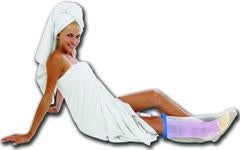
The Dos and Don’ts of Long Leg Cast
Share
A Long Leg Cast is an orthopedic cast applied to immobilize the leg from the toes to the upper thigh. Cast serves as protection for the affected areas and allows broken bones to be set in place as they heal up. It helps to reduce pain, swelling and muscle spasms.
While noting that cast is used in treating fractures and dislocations of the knee, maintaining postoperative positioning and immobilization of the knee, distal leg, and ankle; and for correcting or maintaining the correction of the foot, distal leg, and knee, it is also important to note that there are certain exceptions to the use of this healing material if one must maximize its benefits. Long leg cast however come with distinctive features; for example, some may be reusable while others may not. Visit: https://lpmsi.net/search?q=+Long+Leg+cast to see samples of cast and for more details.
Below are certain measures that can be taken to hasten healing and maximize the use of Long Leg Cast:
Here are the Dos:
- Take proper care of your cast to ensure complete and proper healing.
- Support affected leg with a pillow while lying down.
- Move uninjured fingers or toes frequently to help prevent stiffness and reduction in swelling.
- Always Keep your cast in good condition and prevent dirt, sand and other debris from getting into it. If this happens however, carefully clean the surface with a clean cloth
- Support movement through the use of wheelchairs or crutches rather than staying stagnant all day.
Here are the Don’ts:
- Do not allow water to penetrate through the cast while bathing. Moisture under plaster can cause mold or mildew to build up; this is bad for the skin and can hamper recovery.
- Do not scratch affected areas when you feel itchy but rather, mildly rub the skin around the edge of the cast for a few minutes or blow cool air from a blow dryer into the cast
- Do not remove a cast by yourself. Always have it removed by a trained medical professional because doing so on your own puts you in the risk of cutting yourself or interfering with the healing process and can cause further injury.
- Do not insert objects into the cast as they can get stuck and may cause it to loosen and lose its effectiveness.
- Don’t Ignore excess pain or discomfort. These could however be a sign of serious issues and warrant medical care.
- Do not apply deodorants or powders to skin under the cast due to itching. If itching persists, kindly contact a medical professional for guidance. scratching of the affected area could result in injury, sores, stitches or pull a wound open.
